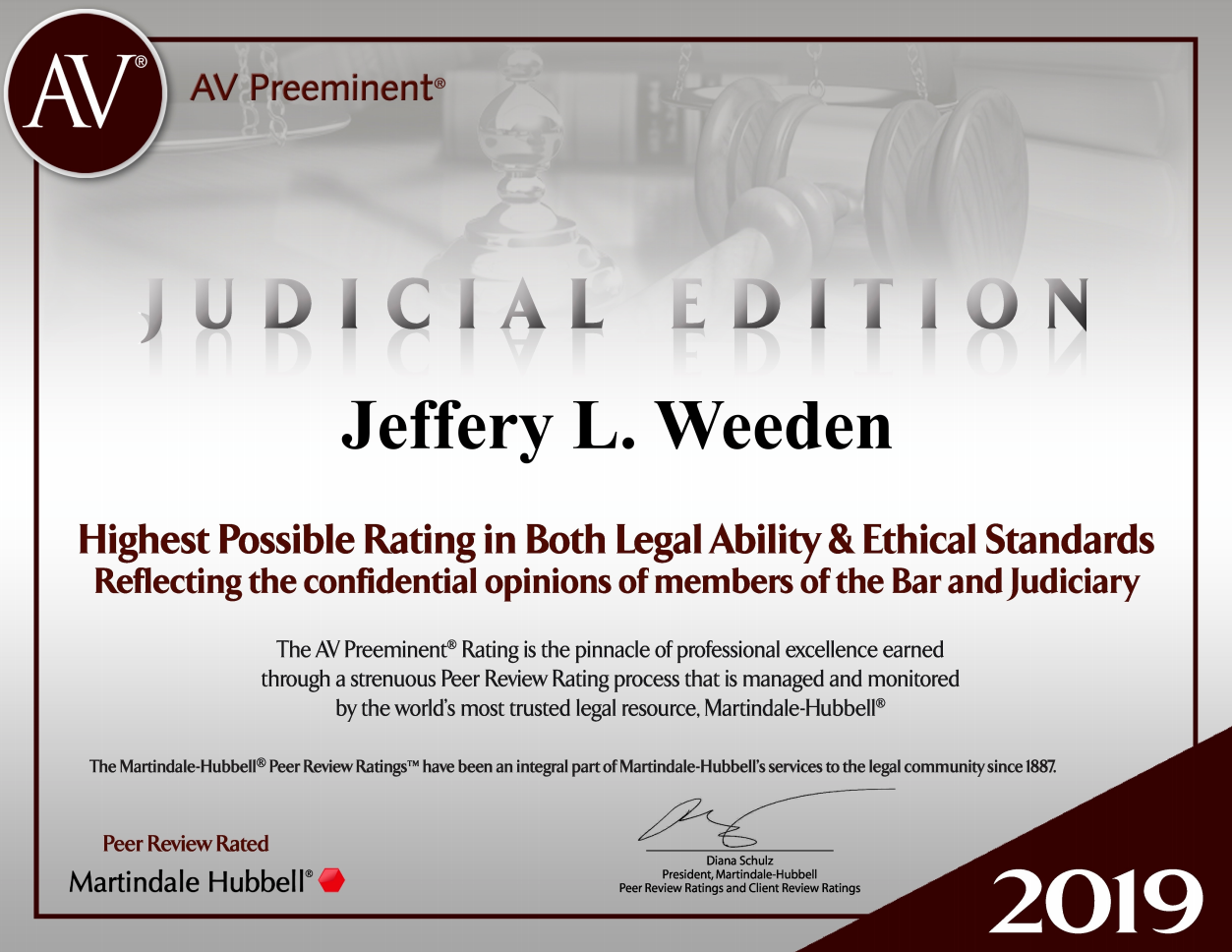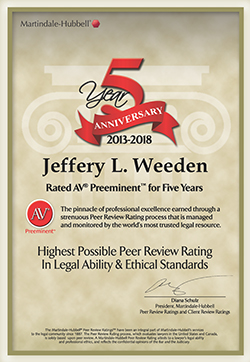Aggressive Criminal Defense for Those Facing Statutory Rape Charges in Denver, CO and Surrounding Areas
Allegations of a sex crime can quickly turn your life upside down and leave lasting consequences, even with no conviction. Sex crimes usually involve some sort of force or non-consensual act, but statutory rape is different. With all the talk of consent in popular culture at the moment, many people think consent is all that’s needed. As long as all parties consent, there’s no harm, right? Wrong. Certain circumstances, even with consent, can result in a felony charge and a lifetime spot on Colorado’s sex offender registry.
If you or a loved one has been accused of statutory rape, it’s essential to contact a Denver statutory rape defense attorney as soon as possible. At WeedenLaw, we know how high the stakes are when it comes to sex crime charges. Our Denver criminal defense attorneys are ready to provide you with an aggressive defense and protect your freedom. For a free consultation in your case with attorney Jeff Weeden, call us today at (720) 307-4330.

What is Statutory Rape?
Statutory rape is a type of sex crime that usually involves an adult and someone too young to legally consent to a sexual relationship. Statutory rape is not a sex crime that involves force or violence, unlike other forms of sexual assault in Colorado.
Statutory Rape Definition
The definition of statutory rape can vary by state, since the age of consent can be different in each state. In Colorado, the definition of statutory rape depends on the age of the victim. When minors under the age of 15 are involved, legal consent stops with someone four years older than them. For minors of 15 and 16, they can consent to sexual relationships with someone less than 10 years older.
Statutory rape is one of many sexual offenses illegal under Colorado law. Statutory rape is often called sexual assault under Colorado criminal law. Technically, there are no direct mentions of statutory rape under Colorado state law. It’s listed as sexual assault under Colorado Revised Statute 18-3-402.
C.R.S. §18-3-402
Colorado Revised Statute 18-3-402 outlines the definitions and punishments for sexual assault. This exhaustive statute covers everything from pretending to be the spouse of a victim to the parental rights of children conceived through rape. The parts that pertain to statutory rape are paragraphs (d) and (e) of subsection (1). Paragraph (d) states that sexual assault occurs if the minor victim is less than 15 years old and the actor is more than four years older. Paragraph (e) states that the crime occurs if the victim is 15 or 16 and the actor is more than 10 years older.
Subsections (2) and (3) outline the punishment for statutory rape, which is a Class 4 felony or a Class 1 misdemeanor in Colorado.
What’s the Difference Between Rape and Statutory Rape?
Statutory rape and rape are two vastly different criminal charges. Statutory rape usually involves some type of consent, while rape and sexual assault are often forceful, non-consensual crimes. The penalty for rape is usually much higher than that for statutory rape.
Colorado’s Age of Consent
The age of consent is the age at which minors can consent to sexual contact. The age of consent in Colorado is 17. Colorado statute, however, provides close-in-age exceptions, which allow those 15 and 16 to engage in sex with those less than ten years older and those less than 15 to engage in sex with those less than four years older. It is different if the eldest is in a position of trust with respect to the person under the age of eighteen.
In relevant part, C.R.S. 18-3-402 states: “Any actor who knowingly inflicts sexual intrusion or sexual penetration on a victim commits sexual assault if: … (d) At the time of the commission of the act, the victim is less than fifteen years of age and the actor is at least four years older than the victim and is not the spouse of the victim; or (e) At the time of the commission of the act, the victim is at least fifteen years of age but less than seventeen years of age and the actor is at least ten years older than the victim and is not the spouse of the victim . . . .”
What is Colorado’s Statutory Rape Statute of Limitations?
Statutory rape has a statute of limitations in Colorado. Felonies usually have a three-year statute of limitations. This short time frame does not apply to charges of sexual assault. Since Colorado law prosecutes statutory rape charges as sexual assaults, the timeframe to pursue a statutory rape charge can be decades-long.
Minor victims of 15 or 16 years of age have 20 years from the day of their 18th birthday to pursue criminal charges for statutory rape. For cases of statutory rape involving minors under the age of 15, the statute of limitations is indefinite.

Sentencing for Statutory Rape Charges in Colorado
A statutory rape conviction in Colorado comes with extensive penalties. Depending on the circumstances of the crime, the prosecution team can pursue a misdemeanor charge or a felony sexual assault charge. If the minor is 15 or 16 and the age difference is more than 10 years, you could be charged with a Class 1 misdemeanor. Statutory rape is an extraordinary risk crime, which means you can face an additional six months in prison. A Class 1 misdemeanor comes with a sentence of six to 24 months in prison, a fine between $500 and $5,000, or both.
If the minor is less than 15 years of age and the age difference is more than four years, you can be charged with a Class 4 felony. This conviction comes with a sentence between two and six years, a fine between $2,000 and $500,000, or both. Felony convictions can also result in more penalties.
Additional Penalties
If the criminal charges are enough to warrant a felony sexual assault conviction, the consequences are more than just jail time and fines. People with a felony sex crime conviction have to register as sex offenders. Felony sex offenders have all of their personal information online, including name, date of birth, address, place of employment, and even fingerprints. This personal information is free for anyone to look up and access. You have to re-register every year and confirm the information for the rest of your life. Lifetime sex offender registration is a way for law enforcement officers and the public to keep tabs on what they consider ‘dangerous criminals.’ Anytime a child is kidnapped, raped, or otherwise harmed, the first suspects are often sex offenders living in the area. This can place a lot of undue suspicion on you, even if you had nothing to do with the crime. Many people have to deal with the stigma and ostracization for their entire life. In some cases, those convicted of a Class 6 felony sexual assault can file a petition to remove themselves from the sex offender registry–but only 10 years after the case has ended.
How a Sex Crimes Defense Attorney Can Help Fight Your Statutory Rape Charges
Working with a Denver criminal defense lawyer can ensure that your rights are protected during this overwhelming process. Those accused of sex crimes have to go through two trials: a criminal trial, and a trial of public opinion. The stigma around sex crime charges often goes well past the courtroom. With the help of an experienced Denver sex crimes defense attorney from WeedenLaw, you can expect aggressive defense inside and outside the courtroom. Starting an attorney-client relationship as soon as possible can give your defense team the time they need to craft the best strategy for your case.

Common Defenses for Statutory Rape
In most statutory rape cases, the minor is rarely the one who makes the allegation of statutory rape. This crime is often reported by the minor’s parents, mandated reporters, or even jealous ex-lovers. Since statutory rape is prosecuted as a type of sexual assault, there are often no eyewitnesses or recorded records. Without proof of sexual intercourse, it’s often very difficult to prove these allegations beyond a reasonable doubt. The burden of proof for criminal offenses lies with the prosecution, so it’s up to them to prove that sexual penetration or sexual intrusion actually happened. The two most common exceptions to statutory rape is the marriage exemption and the close-in-age exemption.
It’s important to note that these exemptions are not valid defenses for forcible sexual assault or rape.
Marriage Exemption
As long as the marriage is valid, no court of law can stop spouses from consensually consummating their relationship. Marriage prevents people from being prosecuted for statutory rape, even if the age difference is greater than legally allowed.
Romeo and Juliet Exemption (Close-in-age)
We all know the story of Shakespeare’s star-crossed lovers. Romeo and Juliet may have met an untimely demise, but their love lives on to protect other lovers like themselves. The close-in-age exemption, more commonly known as the Romeo and Juliet exemption, protects people from being charged with statutory rape if they are close in age. While 17 is the age of consent in Colorado, minors under the age of 15 can consent to sexual contact with other minors less than four years older. This means that a 13-year-old can legally consent to sexual contact with a 16-year-old (just like Romeo and Juliet) because there is less than a four-year age difference.
15 and 16-year-old minors can consent to sexual contact with someone less than 10 years older.
Consent is NOT a Valid Defense
Verbal consent is not a valid defense for statutory rape. In the state of Colorado, underage minors cannot consent to sexual activity beyond the exceptions listed above. Mistake of age is also not a valid defense. Statutory rape is a strict liability crime, which means it doesn’t matter if the minor lied about their age or looked older.
Call the Colorado Statutory Rape Defense Lawyers at WeedenLaw Today
If you or a loved one has been accused of statutory rape in Denver, CO or the surrounding areas, hope is not lost. Contact the aggressive criminal defense team at WeedenLaw as soon as possible. We can begin working on your case immediately and craft the best possible defense strategy for your case. Schedule a free consultation with a Denver statutory rape defense attorney today by calling (720) 307-4330.
































